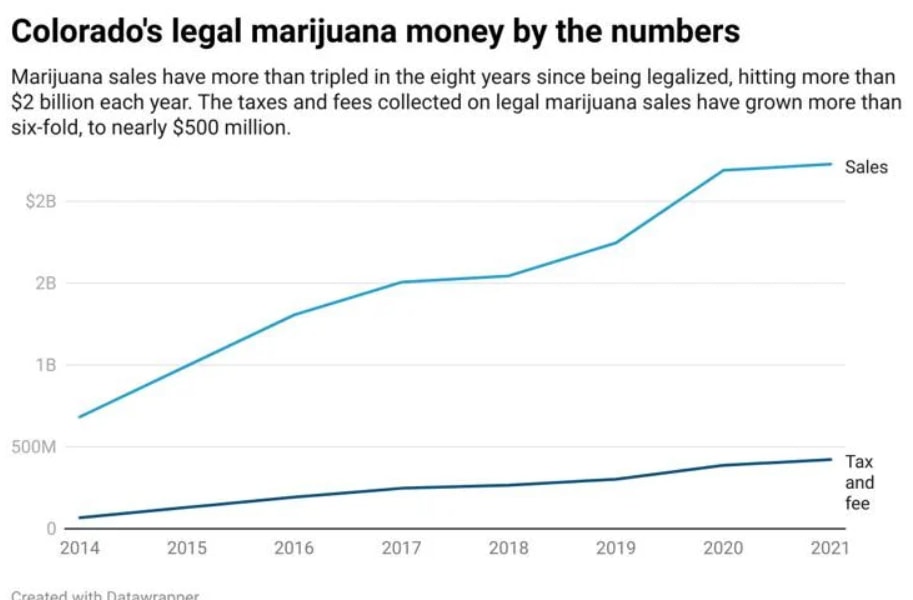Resources
Colorado state tax revenue from the legal cannabis industry surpassed $2 billion in January and the state has collected more than $88.7 million in fees.
In addition to state and local taxes and fees, cannabis businesses have an effective federal tax rate of about 70% – compared to about 26% for other businesses.
Did you know Colorado legal cannabis dispensary owners are unable to deduct normal business expenses like payroll and rent from their federal income taxes?
Marijuana has contributed over $320 Million dollars to Building Excellent Schools Today (B.E.S.T.), making up about 25% of the program's entire budget.
In FY 21-22 alone, nearly $15.3 million in state cannabis dollars went to state Affordable Housing Grant and Loans.
The Marijuana Tax Cash Fund collected $188.8 Million in FY 2021-22 alone.
In FY 21-22 alone, nearly $15 million in cannabis dollars went to the School Health Professional Grant program.
More than $15 million in cannabis dollars went to substance abuse treatment in FY 21-22.
More than $1.6 million cannabis dollars went to the Tony Grampsas Youth Services Program in FY 21-22.
Voters in 59 of 64 Colorado counties voted no on Proposition 119 sending a clear message against raising taxes on cannabis consumers.
Unlike other legalized substances, the marijuana industry has a 97% compliance rate for unauthorized sales.
Unlike alcohol, research has proven you can only get “so high.” Cannabinoid receptors in your brain eventually prevent the body from getting further intoxicated.
Did you know? Since legalization in 2005, teen use in Colorado has remained flat and is below the national average.
According to a recent poll by the Pew Research Center, more than 90% of Americans think cannabis use should be legal.
Did you know? MIG represents more than 400 cannabis business licenses across the state.
A 2021 study found that medical cannabis use was associated with clinical improvements in pain, function, and quality of life with reductions in prescription drug use.
Founded in 2010, MIG is the oldest and largest trade association for licensed cannabis businesses.
Colorado’s marijuana model has become the example for all other regulated cannabis states, and MIG works directly with policy makers to ensure that Colorado’s program is fair, tightly regulated, safe, and successful.
Safe Sales: Every marijuana sale in CO takes place on camera and requires multiple ID checks.
All regulated marijuana in Colorado is tracked from “seed to sale,” with oversight from the Marijuana Enforcement Division.
Established in 2010, MIG has led legislation for child resistant packaging, customer safety resources, and purchase restrictions for 18-20 year olds.
Marijuana is taxed at both state and local levels. This year Aurora built a new $34 Million dollar rec center, fully funded by local marijuana taxes.
The marijuana industry suffers from unfair Federal tax rules, which means that MIG members’ effective tax rates are around 71%.
A 2019 study showed that crime does not increase with legalization.
Conditions for medical marijuana
Cancer - Glaucoma - HIV or AIDS - Cachexia - Persistent muscle spasms - Seizures - Severe nausea - Any condition for which a physician could prescribe an opioid - Autism Spectrum Disorder - Severe pain - PTSD
Most marijuana businesses have access to banks, but because marijuana is still federally illegal, businesses are unable to access merchant processing services such as VISA or Mastercard.
Consuming higher potency marijuana does not lead to higher levels of impairment.
-- Journal of the American Medical Association (JAMA) 2020
71% of Colorado voters favor marijuana legalization. This has increased 10 points in the last four years alone.

The numbers behind Colorado's multi-billion-dollar cannabis industry that keeps on growing
MIG In The News
Colorado cannabis companies sold more than $2.2 billion worth of product in 2021, continuing the trend of increasing sales every year since retail cannabis sales went live in 2014.
By comparison, general agriculture was estimated to account for $1.1 billion in Colorado in 2021, according to the University of Colorado Business Economy Outlook. Tourism brought in $15.4 billion in 2020, according to the Colorado Tourism Office.
Despite sales dropping in January 19% from January 2021, the marijuana industry has undergone changes in recent years that should keep that trend going in 2022 - like allowing publicly traded companies to own businesses in Colorado. That alone has created larger companies and consolidation in the industry, according to business owners and analysts.
Much of this maturation has come at the expense of small cannabis businesses, including single shop owners who were foundational to the industry's emergence.
Colorado marijuana businesses and one of the largest industry groups say those record-setting sales numbers don’t tell the full story of profit margins being eaten up by what they call excessive regulations, one of — if not the — highest sales tax rates on any product sold in Colorado and the overall higher cost of doing business because the product is still illegal under federal law.
“To put it bluntly, it’s like death by a 1,000 cuts, because the more regulation and more taxes couple with the lack of funding or grant options is killing us,” said Melinda Kadinger, chief operating officer and chief financial officer of Cannabis Care Wellness. “There is no real support for this industry.”
Kadinger said the amount her company pays annually in testing fees increased 300% between 2020 and 2021 due to “all the new regulations.”
“People start seeing those dollar signs (on total sales) and think somehow we’re washing our hands with dollar bills in the back here,” said Lisa Lane, chief financial officer of Euflora. “That’s just not the case. That 30% rate of state and local taxes hurts us. Then you add on top of that we can’t deduct normal operating expenses like typical businesses do.
“Many see the cannabis industry as the piggy bank for the state of Colorado.”
Euflora has a grow operation and stores in Aurora, Longmont, Aspen and Denver. Its 16th Street Mall location is one of a handful that opened for legal recreational sales Jan. 1, 2014.
In 2021, Colorado collected $423.4 million in marijuana taxes and fees — which was also an all-time high, according to the Colorado Department of Revenue.
There are multiple taxes and fees imposed on cannabis businesses throughout Colorado. Some of these taxes are imposed on each business such as an annual 15% excise tax. Other taxes vary by municipality or county. For example, Denver imposes its 4.3% sales tax on both medical and recreational marijuana transactions on top of the 2.9% and 9.81% state imposed sales tax on each transaction.
John Andrle, the owner and founder of L’Eagle, an indoor cultivation site and dispensary in Denver said these taxes add up quickly and can kill a business. He said 55% of his profit goes towards taxes even before filing his yearly taxes.
“If any other company was paying 55% tax before filing their federal return there wouldn’t be a single business in this whole country,” he said.
An official with the Colorado’s Marijuana Enforcement Division said they try to streamline regulations as much as possible, and educate businesses owners before they fall out of compliance. But the agency said it just enforces rules that are set by the legislature and Gov. Jared Polis’ office.
“We’re tasked with protecting the public health and safety,” said Shannon Gray, communications specialist for the division. “We get our guidance from the General Assembly, and ultimately from the Governor’s office. … We do try to streamline regulations to make sure they’re easily implementable for our businesses.”
Gray said the biggest reason for the voluminous list of regulations is that the division must regulate the medical sales industry and the recreational, or adult-use, sales separately. The tax structures for each are different, as are the rules and regulations.
The state has about 3,000 cannabis businesses, with about 43,000 employees. Each of those businesses, and individuals, must be licensed — and those licenses must be renewed every year or two.
“It takes a lot of manpower and a lot of resources there to make sure we’re doing it in a timely manner, and don’t have a backlog,” Gray said.
The division has 118 full-time employees and its $22.5 million annual budget is funded by fees. While local taxes and fees assist local municipalities and counties complete projects.
Cannabis company officials said they want to continue supporting community causes, but it’s getting harder.
“People need to understand we’re at our breaking point and we’re not going to be able to support certain causes if we can’t continue to grow economically,” said Tiffany Goldman, the owner of The Health Center and board chair of the Marijuana Industry Group.
Formed in 2010, the group claims to be Colorado's “oldest and largest trade association for licensed cannabis businesses” with about 400 members.
A large chunk of cannabis dollars returns to the state’s public school system. Beginning this year, 100% of the state’s excise tax goes towards the state’s B.E.S.T. Public School Capital Construction Assistance Fund, which is used to build new schools across the Centennial State.
In Denver, $16 million has been used to fund youth prevention programs, $10 million has been used to fund after school programs and $9 million has gone towards affordable housing, according to the industry group.
“I'm really proud $2 billion in funding has gone to causes Coloradans care about like mental health, substance abuse, treatment, public safety and education,” said Goldman. “(Our industry) has contributed up to $300 million in our schools and I don’t know of any other industry doing that.”
That’s out of a total of $12.2 billion in state cannabis sales since 2014 through 2021, according to the revenue department,
Business officials who spoke to The Denver Gazette said they were glad the taxes they pay go towards community projects but said because of the ever-changing regulations and testing rules, they are having to pay more out of pocket annually and is causing some businesses to sell out or close up shop.
Gray said the division has heard the concerns from the industry about too much testing, but that some don’t think there’s enough testing — so it’s subjective.
Since the product is still illegal federally, the division doesn’t have the support of the U.S. Food and Drug Administration or the Environmental Protection Agency, said Gray. But, using scientists on advisory boards, they have still tried to build the state’s testing to conform with those level of requirements, should cannabis become legal federally.
“Testing is really what separates the illicit product from the legal product,” Gray said.
Cannabis Cares’ Kadinger joined the industry in 2014. She, like her husband, Thomas, were both involved in banking prior to switching over to the cannabis industry.
Like most, Kadinger, thought she knew what she was getting into due to her extensive background in finance and banking. She had no idea how difficult the myriad of industry’s rules and regulations would be to navigate.
“Nothing is easier, and everything is harder than I expected,” she said, “and I came from banking, so it’s not like I came from an unregulated industry.”
Though she loves knowing the ins-and-outs of everything she’s involved in, because the marijuana industry's rules and regulations are constantly changing, it’s hard to keep up.
“The rules and regulations of this industry surpass any challenges in the banking industry. Not only is there a lot of them, but they change constantly.”
Kadinger said the biggest differences between large corporations and smaller shops is the lack of money and lack of legal teams. This was consistent with others who spoke to The Denver Gazette.
“The real losers are going to be the small businesses,” she said. “This industry was built by small entrepreneurs. The small guys started this industry in this state, in this country and even the world. Colorado was the seed for almost the whole world. Everyone was watching Colorado and it was the small businesses that started it, and while there’s still a lot of those small companies still around, they’re dwindling day by day. They are either getting priced out of the market or selling out because they cannot keep up with the increase of taxes and increases of regulations.”
For instance, Cannabis Care Wellness traditionally paid between $20,000 to $30,000 annually for testing fees. Between 2020 and 2021, those numbers rose 300%, Kadinger said. Other problems smaller businesses experience is the fact that they cannot receive government assistance and even get taxed when they offer paid time off to their employees.
Euflora’s Lane said everything costs more for cannabis businesses.
“We have to do third-party audits for compliance, which is costly,” she said.
“Look we’re still illegal federally, so there’s certain vendors like repair maintenance companies, or glass companies, tinting companies — whatever … Once they realize we’re cannabis, there’s that little unsaid hike in fees. It puts us behind the eight ball,” Lane said.
Andrew Freedman was appointed by then Gov. John Hickenlooper to be the state’s first “cannabis czar” overseeing the regulation formation before the 2014 retail sales. He’s now the executive director of the Coalition for Cannabis Policy, Education and Regulation, and has helped 17 government entities implement cannabis regulations.
“Because a lot of people don’t want to participate in something that’s illegal federally, services cost more,” Freedman said. “Insurance costs more. Building materials cost more. Land costs more because you bring a certain level of risk.”
All the above can make for “razor thin profit margins,” he said.
But he said Colorado’s extensive set of regulations have largely worked.
“It’s one of the few programs to truly capture the illicit market sales,” Freedman said. “The most common way for a consumer to buy cannabis in in Colorado is through a dispensary. That’s not the case in other states.”
According to the "Impacts of Marijuana Legalization in Colorado" report the state published in July 2021:
"In terms of crime, law enforcement agencies continue to combat illicit market activity. Because of the nature of this type of activity being inherently hidden from regulation and oversight, it remains challenging to quantify the size of the illicit market in Colorado; the state can only track and report the indicators of illegal activity, such as arrests and seizures. The number of plants seized on public lands and the number of out-of-state seizures of marijuana sourced from Colorado has fluctuated significantly over time. The number of court filings for marijuana-related felonies or charges related to the Colorado Organized Crime Control Act has also fluctuated -- in 2019, the number of charges was close to or slightly below 2012 numbers."
Mike Erdman, head of operations at Mile High Sucker, said he does not believe there will be any support on reducing fees or taxes anytime soon, but that doesn’t mean people should stop trying to make it happen.
“If you can at least make some progress at moving towards the halfway ground then you’re doing something right,” he said. “The last thing we can do is accept it as is … because that’s how you end up with Walmart, and I don’t think anyone wants that.”
However, Euflora’s Lane said: “It’d be foolhardy to even ask.”
She and others believe the authors of Amendment 64, which voters approved in 2012 to legalize retail sales, purposefully put in an onerously high tax rate to get it passed — and it will be hard to walk that back.
“We hear every day from our members that their businesses are struggling due to high taxes and fees and ever-growing regulation,” Goldman said.
Goldman said, for example, a new regulation that requires marijuana businesses to enhance security systems and changes how they are allowed to store their product will cost her $100,000 to accommodate.
Goldman said the thing she is most proud of is the fact that the marijuana industry contributes to services across the state.
"We're all proud of where our tax dollars are going and it's really a special thing," Goldman said. "But it's getting harder and harder to keep up with the costs. We need to do all we can to protect these small businesses because they're the backbone of this industry and were the ones who wrote the laid the ground work for this industry."
Images

Additional Info
Related Links : https://denvergazette.com/premium/the-numbers-behind-colorados-multi-billion-dollar-cannabis-industry-that-keeps-on-growing/article_861eaad8-a07b-11ec








